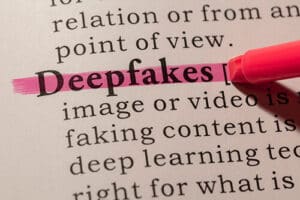Influence of Manipulated Digital Evidence in Family Court Decisions
Is it Authentic? Deepfake Evidence Poses New Questions and Challenges in New Jersey Family Law Cases
 Deepfakes are launching new and unsettling hurdles right into the New Jersey family courts. The products of deepfake tech include items like fabricated videos, audio footage, and photographs, which can facilitate fraudulent results, legal issues, and pricey outcomes. Evidence plays an integral function in decisions regarding divorce, custody, and support, so deepfakes can wreak serious havoc and bulldoze over New Jersey ethics and justice.
Deepfakes are launching new and unsettling hurdles right into the New Jersey family courts. The products of deepfake tech include items like fabricated videos, audio footage, and photographs, which can facilitate fraudulent results, legal issues, and pricey outcomes. Evidence plays an integral function in decisions regarding divorce, custody, and support, so deepfakes can wreak serious havoc and bulldoze over New Jersey ethics and justice.
Envision a dad who is fighting for custody of his child. Unexpectedly, a new video enters into evidence, painting this father as totally unfit. The video shows him appearing wildly intoxicated, shouting belligerently, or acting recklessly in front of his kids. The footage appears authentic, but it’s actually totally fabricated using deepfake cyber technology. Scary, right? Without sound expert analysis, false evidence like that can run rampant. The whole situation could end in influencing the course of legal judgments. Worse, the connection between parent and child can be tainted, potentially changing the entire course of a parent-child relationship. For any chance of protecting yourself in these scenarios, you will need to learn what deepfakes are, how they are generated, and how they are challenged in a legal sense.
Understanding the Potential Misuse of Hyperrealistic AI Manipulation
Deepfakes are extremely well designed, and thus, hyperrealistic fake video footage, audio passages, or imagery forged by AI or artificial intelligence can go undetected as false. The process seamlessly manipulates existing footage or audio by replacing faces, altering voices, or fabricating entirely new scenarios. Computer learning algorithms and deepfake technology analyze tens of thousands of images, sounds, or frames at a shockingly fast speed and produce content that appears original or authentic to the inexperienced eye.
A Practical Example of Deepfake Technology
For example, someone creating a deepfake video would upload hours of footage of a person’s face and voice into technical and special software. AI computes these inputs to contrive fake but convincing content–like a video of someone making statements or completing actions that never transpired.
While deepfake production has some legitimate intents across different disciplines like education and scientific simulation, its misuse in the legal realm can have really nasty and lasting repercussions–especially when it runs unchecked.
Tools and Techniques to Uncover Fake Audio and Visual Content
Establishing the false nature of a deepfake requires a combination of observation and technical tools. An expert analysis can identify visual cues. Fake videos often include subtle errors that can be telling of tampering. These alerts can consist of blurred edges around faces, unnatural blinking patterns, or inconsistent lighting and shadows. Meticulous critique of these components can uncover deepfakes. You can also look for auditory hints of a deepfake, like certain irregularities. Advanced tools and digital forensic methods can be used to analyze metadata (data regarding other data), frame rates, and patterns within artificial content. Experts have the skill set to look for indications of falsification or manipulation and track the source. When a deepfake is suspected, clinical experts can put the question of the validity of the evidence to rest by determining its authenticity.
What You Need to Know About Deepfakes Distorting NJ Family Law Cases
Deepfakes have materialized as divisive and deceitful means in contentious family law battles. Courts in New Jersey depend on proof to determine custody, divorce, and child support disputes. When fabricated evidence enters, it can tamper with the case, misstate facts, demolish reputations, and produce unjust rulings.
Because family law disputes often draw strong emotions with high stakes, parties can sometimes turn malicious and try panting deepfakes as weapons. Without awareness, such falsified content could result in judges leaning into decisions that are actually based on lies. Deepfakes are a menace to family law cases, creating false accusations and misleading evidence. They can slant the truth in diverse cases, including custody disputes, divorce proceedings, and child support cases.
How Deepfakes Threaten Justice in Child Custody Battles
In custody battles, deepfakes have the opportunity to unjustly influence court judgments by portraying parents in a negative light. Fabricated videos might show a parent partaking in destructive or neglectful behavior like yelling or abusing a child or appearing under the influence. Alternatively, corrupted audio recordings can twist or misrepresent a parent’s words or behavior, labeling them unable or unfit to have custody. Then, when such evidence gets taken for face value, the court can limit or deny custody rights, harming both parent and child.
The Role of Deepfakes in Poisoning Divorce Proceedings
In divorce, individuals can arm themselves with deepfake tech and attempt to damage a spouse’s character perception and credibility. Spousal fidelity can be brought under examination because of fabricated evidence depicting them committing adultery or other inappropriate conduct. Deepfakes can influence decisions about property division or spousal support, causing life-altering consequences.
Fabricated Hardship to Argue for More Support

Legal Risks and the Quest for Authentic Evidence
Unique challenges in the legal system are presented due to deepfakes. False AI-generated content can be challenged by forensic analysis to verify its genuineness. Legal teams who break the law by committing deepfakes face immense consequences, like even getting disbarred. However, most attorneys recognize their stately duty to demonstrate authentic evidence. Opposing deepfake evidence requires diligence to expose it as fraud. Deceiving the legal system by producing and using deepfakes can translate to criminal charges like fraud and perjury. Persons guilty of these corrupt offenses will see major fines, jail time, or severe punishments.
Combat Deepfake Evidence with Experienced New Jersey Family Law Representation
You must be proactive, especially if you suspect that your family law case is being impacted by the other side using deepfake creations. Stay informed by enlightening yourself about this technology, changes to the law, and potential new uses of deepfakes. Most importantly, you need to keep a record of the truth. Preserve detailed documentation and records from texts to financial statements as they can help oppose false claims. Be prepared to pull in the services of forensic specialists who can dissect evidence, search for and identify deepfakes, and present proof of deepfakes to the court. It is difficult to challenge the court’s misconstrued findings when they believe the source of those findings, like video evidence or audio recordings, is genuine. However, a skilled New Jersey family law attorney at Bronzino Law Firm can help contest the fabricated evidence and guard your reputation against deepfakes and their impact on your case. As this genre of tech matures, deepfake manufacturing will evolve, increasing the difficulty of distinguishing it from actual evidence, all while threatening families and family law proceedings and their outcomes. But true justice is still alive!
If you are dealing with the infiltration of your family law matter by deepfakes in Toms River, Seaside Heights, Holmdel, Shrewsbury, Manchester, Freehold, Red Bank, Middletown, Brick, Berkeley, Wall, or elsewhere in Ocean and Monmouth County, contact experienced NJ family lawyer Peter Bronzino, Esq. at (732) 812-3102 for a confidential free consultation.







